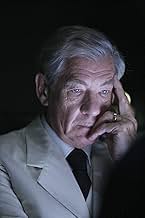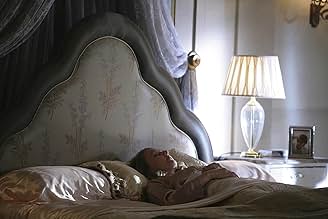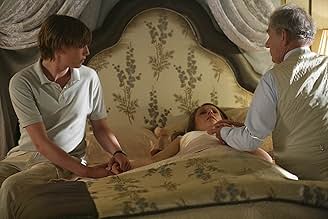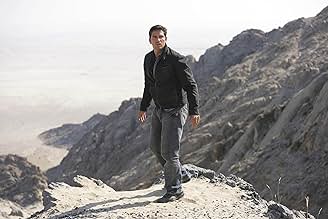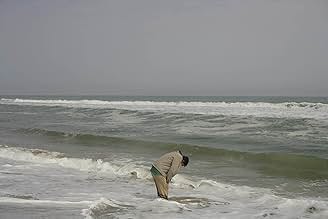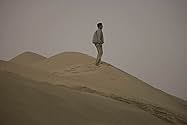The Prisoner
- Mini serie TV
- 2009
- 45min
VALUTAZIONE IMDb
6,1/10
8153
LA TUA VALUTAZIONE
Un agente governativo viene rapito e si ritrova in un'isola misteriosa chiamata "Il Villaggio", dove gli abitanti sono identificati solo da numeri e nessuno può fuggire.Un agente governativo viene rapito e si ritrova in un'isola misteriosa chiamata "Il Villaggio", dove gli abitanti sono identificati solo da numeri e nessuno può fuggire.Un agente governativo viene rapito e si ritrova in un'isola misteriosa chiamata "Il Villaggio", dove gli abitanti sono identificati solo da numeri e nessuno può fuggire.
- Candidato a 2 Primetime Emmy
- 10 candidature totali
Sfoglia gli episodi
Recensioni in evidenza
Yikes. I don't know what standards The Prisoner is being compared to by other reviewers (other than obviously the original series, which is completely different). While not absolutely stellar, it certainly is superior to almost everything out there on network TV. While it's sometimes difficult to figure out where the four first hours are going, the last two hours are really delivered with the tone of cerebral and philosophical thriller that chillingly ties the mini-series together. I thought the Prisoner's social commentary on the balance between impersonal technology and personal consciousness which is hammered home in the ending sequences was especially effective. The acting level was also certainly above network TV level -- McKellen giving a creepy performance that ultimately becomes understandable as No. 2, and Cazieval, who likes many of his other roles, brings a humanity to character who doesn't quite understand what is going on to him. There are certainly flaws in the production and scripting, but if you come with an open mind and not prepared to judge the series in the context of the original series, I think it's a worthwhile investment of the viewer's time.
Would anyone really want to see a verbatim remake of a 1960s TV series? C'mon people, spies? It's not the cold war. Let the new series explore themes of paranoia, subversion, and identity in a new, interesting, and CURRENT context. At the same time it's adding new mystery. Part of the fun is figuring out what's going on. I wouldn't want a replica mystery and therefore be spoiled. I applaud the update, its creepy, technically sound, and confusing as hell. Granted, the acting is not top notch, Caviezel is doing the best he can but can't carry it, although McKellen and Ruth Wilson are great. Is it perfect? No. But does it deserve 1-2/10 just because it doesn't mimic its predecesor? C'mon people stop living in the past.
OK, I get the concept that the AMC production is in no way a sequel-type update to the 60's TV show. No argument there.
But--and I am sincere--can anyone actually provide me (and probably MANY others) with a detailed story line? A CLEAR plot summary? The writers/producers obviously wanted to keep viewers guessing and engaged, but there was never enough detail to determine which were flashbacks and which were...something else. And the last chapter was way too obtuse. It's fine that parts of the series wanted to comment on grand themes and deep societal concepts like the original did, in a modern way, but a more sharply-defined story line could easily do that, and probably hold everyone's attention longer. (Note: I can't buy into any explanation that says "It was all an allegory...it's whatever you think it means." There was enough of that already built-in to each episode.)
The pacing was awfully slow. The whole story could have been told well in 4 hours instead of 6. I found myself starting to want more unexplained holes in the sand and explosions just to pick up the action a bit.
You don't suppose that this was all an evil trick, the creation of a wicked team, to get us to watch all the episodes and then realize that WE were the prisoners for six hours?
But--and I am sincere--can anyone actually provide me (and probably MANY others) with a detailed story line? A CLEAR plot summary? The writers/producers obviously wanted to keep viewers guessing and engaged, but there was never enough detail to determine which were flashbacks and which were...something else. And the last chapter was way too obtuse. It's fine that parts of the series wanted to comment on grand themes and deep societal concepts like the original did, in a modern way, but a more sharply-defined story line could easily do that, and probably hold everyone's attention longer. (Note: I can't buy into any explanation that says "It was all an allegory...it's whatever you think it means." There was enough of that already built-in to each episode.)
The pacing was awfully slow. The whole story could have been told well in 4 hours instead of 6. I found myself starting to want more unexplained holes in the sand and explosions just to pick up the action a bit.
You don't suppose that this was all an evil trick, the creation of a wicked team, to get us to watch all the episodes and then realize that WE were the prisoners for six hours?
1967's Cold War and its counter culture are gone; they've been replaced by 2009's global village and its consumer culture. So 2009's Prisoner is no longer an angry young man fighting for his identity against secret government policies and flagrant brainwashing, he's an angst-ridden 30-something trying to hang on to his identity in the face of overwhelming marketing and soothing pharmaceuticals.
2009's The Prisoner takes all the familiar elements of 1967's cult classic and re-interprets them in a relevant way, just like good remakes are supposed to. The psychedelic, lava-lamp surrealism of the sixties may be gone, but, don't worry, they've been replaced by the post-modern, dream-like surrealism of the oughts.
Yes, the Village still needs to assimilate No. 6, but it no longer cares why he would wish to resign from its society, it only wants him to understand that he can't. Instead of foiling No. 6's repeated escape attempts from the superficially charming, but inherently oppressive, Village, this new Village, still just as pleasant-looking, and oppressive, just makes it clear that there is no place else to escape to. The consumer culture and its global village are everywhere now. There is no escape.
So, instead of a government desperately trying Pavlovian conditioning, hypnotic suggestion, and hallucinogens in the water, a corporation tries matching people with their perfect mates, giving them mind-numbing jobs to take their minds off their melancholy, distracting them with melodramatic soap operas, and, maybe, making them feel a little better with some gene-therapy.
Sure, everyone's still under surveillance in this Village, but this time, its not the Village government trying to identify revolutionaries so it can silence them, its the Summakor corporation trying to identify dreamers so it can subject them to a concentrated dose of consumer culture. And if that doesn't work, maybe a few pharmaceuticals and a promotion will co-opt the more troublesome ones.
2009's The Prisoner takes all the familiar elements of 1967's cult classic and re-interprets them in a relevant way, just like good remakes are supposed to. The psychedelic, lava-lamp surrealism of the sixties may be gone, but, don't worry, they've been replaced by the post-modern, dream-like surrealism of the oughts.
Yes, the Village still needs to assimilate No. 6, but it no longer cares why he would wish to resign from its society, it only wants him to understand that he can't. Instead of foiling No. 6's repeated escape attempts from the superficially charming, but inherently oppressive, Village, this new Village, still just as pleasant-looking, and oppressive, just makes it clear that there is no place else to escape to. The consumer culture and its global village are everywhere now. There is no escape.
So, instead of a government desperately trying Pavlovian conditioning, hypnotic suggestion, and hallucinogens in the water, a corporation tries matching people with their perfect mates, giving them mind-numbing jobs to take their minds off their melancholy, distracting them with melodramatic soap operas, and, maybe, making them feel a little better with some gene-therapy.
Sure, everyone's still under surveillance in this Village, but this time, its not the Village government trying to identify revolutionaries so it can silence them, its the Summakor corporation trying to identify dreamers so it can subject them to a concentrated dose of consumer culture. And if that doesn't work, maybe a few pharmaceuticals and a promotion will co-opt the more troublesome ones.
This is a completely unique interpretation of The Prisoner (1967), so if you are expecting a remake, it will disappoint you. I was an avid viewer of the original. While it shares some imagery and key aspects, beyond that this is a standalone original TV series. Instead (and for some context), imagine what sort of world you live in now, and that someone kidnaps you and you wake up in a mythical village. The question then is why? These changes are not always bad things.
The narrative structure is except for the last episode, also different. The original had concrete narrative blocks, which meant each episode had some clarity. In this series there is no obvious individual narrative block in each episode, the plots run around semi-randomly, only pose questions and don't answer them. The last episode is ironically clearer than the original series, but still leaves the viewer with some sense of confusion. Also, this series only works if you watch it until the end. The dialogue is ok, occasionally very good, but often seems a little too contrived.
Many of the themes from the original series remain such as identity, individuality etc, but perhaps because of the more modern style feel lost or half hearted. There is too much going on, and as a result it lacks depth. This series is from 2009, with a different acting style to the 1960s. Back in those days, stage style acting often appeared on TV, and the original series was no exception to this. Sometimes this worked, other times it was just over the top. Fast forward to this version and the acting is more consistent and suited to the small screen. As ever, Ian McKellen does an excellent job. Jim Caviezel is 90% there. His acting sometimes shines, but it lacks the consistent, excellent performance that you get from McKellen. It feels like he just needs more rehearsal and an injection of some spontaneity now and again. Otherwise his performance and those of the supporting cast is consistent, good but lacks buzz. It feels unfair to compare everyone in The Prisoner to someone such as Ian McKellen, but you just can't help it. In reality, he just lacked a comparable sparring partner in this series.
Image is everything, and the sets and locations are as impressive as the original series. Perhaps more menacing is the sheer similarity of most houses except for the Palace of No. 2. This serves to make the feeling of forced conformity clearer. The design team did an excellent job, with one notable exception, The Clinic; it just feels lame in terms of interior and exterior. There are some occasional references to the original series.
Overall, this series is watchable. Not bad, but just not as good as it could have been. The writing and episode structures are just too confusing and will put many people off. This is a great pity, as its ending is no less clever than the original, only different. Try to get to the end and you will get some reward. This series just tries to hard which is why it doesn't quite make it.
The narrative structure is except for the last episode, also different. The original had concrete narrative blocks, which meant each episode had some clarity. In this series there is no obvious individual narrative block in each episode, the plots run around semi-randomly, only pose questions and don't answer them. The last episode is ironically clearer than the original series, but still leaves the viewer with some sense of confusion. Also, this series only works if you watch it until the end. The dialogue is ok, occasionally very good, but often seems a little too contrived.
Many of the themes from the original series remain such as identity, individuality etc, but perhaps because of the more modern style feel lost or half hearted. There is too much going on, and as a result it lacks depth. This series is from 2009, with a different acting style to the 1960s. Back in those days, stage style acting often appeared on TV, and the original series was no exception to this. Sometimes this worked, other times it was just over the top. Fast forward to this version and the acting is more consistent and suited to the small screen. As ever, Ian McKellen does an excellent job. Jim Caviezel is 90% there. His acting sometimes shines, but it lacks the consistent, excellent performance that you get from McKellen. It feels like he just needs more rehearsal and an injection of some spontaneity now and again. Otherwise his performance and those of the supporting cast is consistent, good but lacks buzz. It feels unfair to compare everyone in The Prisoner to someone such as Ian McKellen, but you just can't help it. In reality, he just lacked a comparable sparring partner in this series.
Image is everything, and the sets and locations are as impressive as the original series. Perhaps more menacing is the sheer similarity of most houses except for the Palace of No. 2. This serves to make the feeling of forced conformity clearer. The design team did an excellent job, with one notable exception, The Clinic; it just feels lame in terms of interior and exterior. There are some occasional references to the original series.
Overall, this series is watchable. Not bad, but just not as good as it could have been. The writing and episode structures are just too confusing and will put many people off. This is a great pity, as its ending is no less clever than the original, only different. Try to get to the end and you will get some reward. This series just tries to hard which is why it doesn't quite make it.
Lo sapevi?
- Quiz"Be seeing you" is a commonly-heard phrase in Il prigioniero (1967), this movie, and was also one of Patrick McGoohan's catchphrases in Danger Man (1960) and Gioco pericoloso (1964) . McGoohan's character "Johnny Cousin" (a pot-smoking drummer) in All Night Long (1962) uses the phrase also when he says goodbye to the road manager "Berger" towards the end of the movie.
- ConnessioniFeatured in A Six Hour Film Shot in 92 Days: The Diary of 'The Prisoner' (2010)
I più visti
Accedi per valutare e creare un elenco di titoli salvati per ottenere consigli personalizzati
- How many seasons does The Prisoner have?Powered by Alexa
Dettagli
- Tempo di esecuzione45 minuti
- Colore
- Proporzioni
- 1.78 : 1
Contribuisci a questa pagina
Suggerisci una modifica o aggiungi i contenuti mancanti



